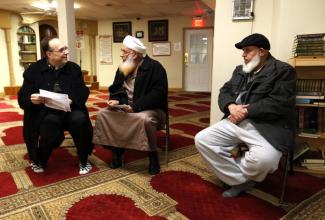Inter-faith dialogue
Shared values

Obiora Ike is a Catholic priest and intellectual from Nigeria. He is involved in inter-faith dialogue with Muslim faith leaders. He says that this kind of interaction has enormous potential, not least for preventing violence and safeguarding civil-political discourse. Inter-faith councils, he says, are basically elders’ councils that wield much influence.
Ike emphasises that faith-leaders of all religions are closely in touch with the people at the grass-roots level, understand their needs and enjoy their trust. Accordingly, they can play a role in driving development in general.
In Ike’s experience, international aid agencies tend to underestimate just how much religion matters in Africans’ daily lives. According to him, many of them will point out needs such as safe water supply, employment or better transport opportunities, but when asked what their greatest wish is, they will say they want a church in their village. The priest points out that churches bring people together. By spreading a message of justice and peace, moreover, church leaders can drive development in a positive sense.
Wolfram Stierle of BMZ agrees that religion matters very much. If humanity is to achieve the Sustainable Development Goals, he argues, religious leaders must play their part. The agenda is too urgent and too ambitious to be left to governments. Accordingly, development agencies should pay attention to people’s faith. In Stierle’s eyes, many western development professionals do not understand religious contexts. He considers such ignorance to be “unprofessional”.
In recent years, the BMZ has been taking a more open-minded approach towards faith-based organisations (see box). Stierle emphasises that the BMZ does not want to promote faiths or even support their missionaries. Gerd Müller, the federal minister who heads the BMZ is a devout Catholic, but his department is not endorsing a specific religion. The idea is to promote values that are shared by all. The overarching idea is to achieve the SDGs and implement human rights (please also note comment by Meike Geppert).
The BMZ is fully aware of religious affiliations sometimes causing harm. Faith-based organisations all too often exacerbate violent crises. Stierle says that, though conflicts only rarely arise from genuinely religious issues, they are often read according to a narrative of clashing religious communities. Once such a narrative is established, it can be manipulated for political purposes. In many countries, identity politics serves to marginalise minorities and entrench the power of dominant groups.
At a conference held by Germany’s Protestant development agencies in Schwerte in the Ruhr area in April, participants discussed options for preventing faith-based identity politics. It was acknowledge that all major religions can be instrumentalised in destructive ways. Examples of populist leaders who do so include Turkey’s Recep Tayyip Erdogan (a Sunni Muslim), India’s Narendra Modi (a Hindu) or Poland’s Jaroslaw Kaczynski (a Catholic Christian). It was also noted that Donald Trump too managed to exploit religious sentiments for his purposes. In the election campaign, he railed against Muslims and promised to appoint an anti-abortion judge to the US Supreme Court, and he won most of the votes of Evangelicals in the recent US elections in spite of his divorces and sexist language.
Experts struggle to come up with conclusive strategies to thwart identity politics. It is obvious, however, that international development agencies must distinguish helpful faith-based organisations from harmful ones. Otherwise, they may end up supporting the wrong ones. Jochen Motte of UEM, a Protestant agency based in Wuppertal, recommends taking into account four criteria. In his view, an organisation that promotes justice, life, peace and liberation is a driver of development, while those organisations that do not do so block development. To what faith they belong, is not relevant in developmental terms.
Tarek Abdelalem, the chief executive of Islamic Relief Germany, agrees – and he sees scope for more fruitful inter-faith dialogue in the future. Every religion, he says, is about humans’ relationship to God, to one another and to their environment. So far, inter-faith dialogue has mostly focused on the relationship to God, which is the one on which they disagree most. Cooperation, he argues, would benefit from discussing the other two issues. Values converge across religions in regard to them. All major faiths, he says, are marked by a striving for peace, justice and charitable solidarity.
Abdelalem’s value system includes human rights. In regard to Egypt, for example, he says that donor governments and civil-society organisations must speak out against the regime’s human-rights violations. He says, any authoritarian regime will feel free to take repression one step further if it has the impression that the international community accepts its course of action.








